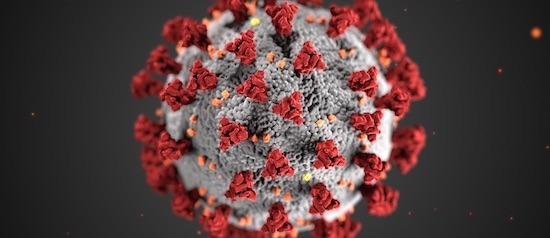
Novel coronavirus Severe Acute Respiratory Syndrome coronavirus 2 (SARS-CoV-2), by Alissa Eckert, MS and Dan Higgins, MAMS
LIVE ONLINE EVENT
Fantastic Voyage and Representing COVID-19
Hollywood and the Centers for Disease Control and Prevention have faced similar challenges in visually representing microscopic threats to the human body. The iconic sci-fi film Fantastic Voyage (1966) and the ubiquitous 2019 illustration of COVID-19 both render elusive yet life-threatening ailments.
The Academy Award-winning Fantastic Voyage, directed by Richard Fleischer, is a landmark for its depiction of the body and its interior. Starring Raquel Welch and Donald Pleasence, Fantastic Voyage imagines a future in which medical technicians literally enter the body to treat illness; they are shrunk and injected into a dying scientist who knows Cold War military secrets, in order to annihilate a blood clot situated in an inoperable area. Nanorobots and laparoscopic cameras can now enter these inner realms, so Fantastic Voyage remains intriguing for the prescience of its cinematic vision. Medical illustration, like special effects, can present an aestheticized image with the unique capacity to capture the imagination, as well as to inform and educate. In 2020 the spiky blob—the illustration of the SARS-CoV-2 virus that causes COVID-19—has become an iconic image associated with the current pandemic, more prevalent and provocative than any direct technological visualization of the virus.
On June 25, Museum of the Moving Image’s Science on Screen series is thrilled to welcome CDC medical illustrator Alissa Eckert, the person responsible for creating the image of the spiky blob, for a conversation and Q&A, including clips and images, with science and technology scholar and author David Serlin (Imagining Illness: Public Health and Visual Culture). The conversation will consider illustration and visualization, public education and accessibility, and the development of the image of COVID-19.
In advance of the conversation, we encourage you to watch Fantastic Voyage, which can be rented from these platforms. View trailer.
Watch the live conversation on YouTube here.
While this event is free, we hope you will consider supporting the Museum with a donation. Staff are working hard to fulfill our mission via remote programming. This comes with opportunities to experiment but also profound challenges. Your support is critical to ensure our work remains vital and visible to a broad public. Suggested donation: $10. Donate here.
About the participants:
Alissa Eckert is a medical illustrator at the Centers for Disease Control and Prevention (CDC). She created the illustration of the novel coronavirus, together with colleague Dan Higgins. She has been at the CDC for 14 years, working on health information, education, and emergency response illustrations including for Ebola, cholera, gonorrhea, Zika, measles, and more. Alissa Eckert has a bachelor’s degree in scientific illustration from the University of Georgia and a Master of Science in medical illustration from the Medical College of Georgia.
David Serlin is Associate Professor of Communication and Science Studies at UC San Diego. He is also an affiliated faculty at the Center for the Study of Social Difference at Columbia University. Professor Serlin’s books include Imagining Illness: Public Health and Visual Culture (University of Minnesota Press, 2010) and Replaceable You: Engineering the Body in Postwar America (University of Chicago Press, 2004). He is an editor-at-large for Cabinet magazine and a founding editor of the online journal Catalyst: Feminism, Theory, Technoscience.

